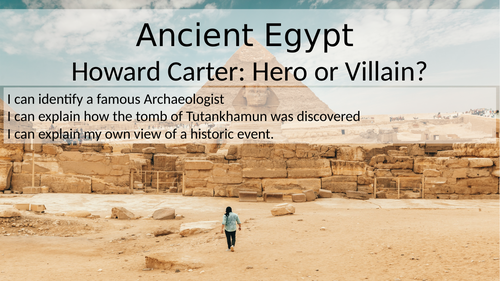



Suitable for debate across Key Stage 2.
Engage in a thought-provoking exploration of archeology and ethics with Lesson 5 - “Howard Carter: Hero or Villain?” from our comprehensive exploration pack. In this captivating lesson, students will delve into the complex persona of Howard Carter, the renowned archaeologist who discovered Tutankhamun’s tomb. They will critically analyse the ethical considerations surrounding Carter’s actions and ultimately determine whether he was a heroic figure or a controversial character.
Key Features of Lesson 5 - Howard Carter: Unraveling the Ethical Dilemma:
Investigating Howard Carter: Students will embark on a journey to uncover the life and achievements of Howard Carter, exploring his contributions to Egyptology and the controversies that surround his work.
Ethical Discussions: Foster critical thinking and ethical reasoning as students engage in lively discussions and debates surrounding the actions and choices made by Carter. They will explore the ethical considerations inherent in archeology and evaluate the impact of his discoveries on ancient Egyptian heritage.
Defining Heroism: Facilitate a deeper exploration of heroism by encouraging students to think about the positive and negative impacts on other people’s lives caused by Carter and his team. They will apply these criteria to assess Carter’s actions and determine whether he meets the criteria of a hero or a villain.
Reflection and Decision-making: Empower students to form their own opinions through reflective activities and decision-making exercises, considering the different viewpoints and evidence presented. They will articulate their stance on whether Carter should be regarded as a hero or a villain.
By engaging in ethical discussions and critically evaluating the actions of Howard Carter, students can think deeply about the intersection of archeology, ethics, and cultural heritage.
This captivating lesson sparks curiosity, cultivates ethical reasoning, and encourages students to form their own opinions based on evidence and critical analysis. It fosters a deeper appreciation for the complexities inherent in the field of archeology and encourages students to consider the broader implications of preserving cultural heritage.
Something went wrong, please try again later.
This resource hasn't been reviewed yet
To ensure quality for our reviews, only customers who have purchased this resource can review it
Report this resourceto let us know if it violates our terms and conditions.
Our customer service team will review your report and will be in touch.